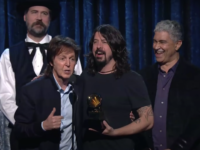Dave Grohl has, for the most part, put aside his throat-bleeding yell. Thank the gods. Oh, it’s still there, to be sure: “Bridge Burning” comes tearing out of the speakers at full bore, Grohl hollering away, but that gives way to singing pretty quick, and then he sticks with it for most of the album’s length, and what a great thing that is.
Why? Because this is, hands down, the best Foo Fighters release. It’s a pure, straight-up rock record, the kind we so rarely see, the kind that needs no genre hyphenation to describe itself. Not alternative, not alt-rock, not metal. Just rock.
I hesitate to say it for the associations some will make, but: think 80s rock, without the hair, makeup, or stupid lyrics, but keep the fun. That’s the primary factor with Wasting Light, it’s a helluva lot of fun to listen to. “Rope” has one of the best, yet simplest riffs in years, and it will bury itself deep in your brain. Similarly, “Dear Rosemary” is another riff-fest, especially fun with headphones where one set of great riffs are sent to one side and another are sent the other way (one set of those being the great Bob Mould.) Dig the very Kinks/Knack-like riff in particular around 2:00, it kills me every time. Thank the great mix-master Alan Moulder and former Nirvana producer Butch Vig for stuff like that — clever, clever guys who know exactly how to treat each and every note so your ear sucks it down like the candy it should be.
I only point out these two songs but the album is packed from beginning to end with solid songs, stumbling only on “White Limo,” which borrows just a little too heavily from Grohl’s short stint with Queens Of The Stone Age (“Six Shooter” in particular) and “Miss the Misery,” which just feels a bit generic for such an otherwise great album. But it gets right back on track again with “I Should Have Known,” a down-trodden piece featuring Nirvana cohort Krist Novoselic, whose deep, gritty bass is put to great use in the song’s latter half.
This is a big album. Foo Fighters blew up years ago, making themselves a household name, but for the first time it feels like maybe they’ve created something beyond themselves, something so surprisingly good that it should be almost a crime to dislike. Maybe that’s an overstatement, but this feels like reinvention of what the Foo Fighters are, and a triumphant one at that.
- King Crimson’s Brief But Important Double-Trio Era Peaked With ‘Thrak’ - April 14, 2025
- How David Bowie’s ‘Reality’ Stood Out For What It Was Not - September 29, 2023
- Metallica’s ‘St. Anger’ Was Always Much Better Than They Said - June 8, 2023




Foo Fighters always had a lot to prove. Despite David Grohl’s intent to break ties from the shadow of Nirvana, lyrics and song structure for the (newly) quintet were never rocket science, oriented more for the masses than for the exploring connoisseur. That’s why after the departure The Colour and the Shape meant, the stagnancy of four subsequent records made the disappointment even more deafening. The same trite of loud/quiet combination and chord progression twisted to all the possible forms called for a rapid change.